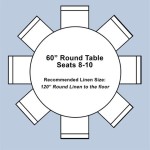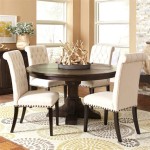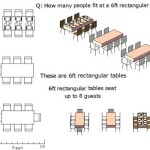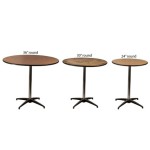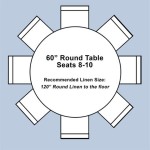Is A Round Table Better For Small Spaces?
Choosing the right furniture for a small living space is a critical aspect of interior design. Maximizing functionality and creating an illusion of spaciousness are key objectives. In the selection process, the shape of a dining or living room table is a significant consideration. While square and rectangular tables are common choices, round tables offer distinct advantages in confined areas.
This article examines the proposition that a round table is a superior option for small spaces. It explores the specific factors that contribute to this claim, assessing aspects such as space optimization, flow of movement, social dynamics, and aesthetic appeal. Through a careful evaluation of these elements, the article aims to provide a comprehensive understanding of the potential benefits of incorporating a round table in a compact living environment.
Space Optimization and Efficiency
The primary advantage of a round table in a small space lies in its efficient use of available area. Unlike rectangular tables, which necessitate ample clearance around their longer sides, round tables occupy a smaller footprint relative to the seating they provide. The absence of sharp corners allows for a more fluid circulation pattern, preventing the feeling of congestion often associated with angular furniture in confined areas.
The circular shape allows chairs to be positioned more closely together than around a rectangular table. This configuration minimizes the overall area required for the table and seating combined. In a square room, a round table effectively softens the angularity, creating a visual focal point that draws the eye and prevents the space from feeling boxy. Furthermore, the lack of corners eliminates the potential for wasted space in the corners of the room, which can be particularly beneficial in small apartments or studios.
Consider a scenario where a rectangular table comfortably accommodates four people. In a small dining area, this rectangular table might impede movement and create a cramped atmosphere. Conversely, a round table of comparable seating capacity would occupy a smaller overall area. People can navigate around the table more easily, and the visual impact of the furniture is less domineering, contributing to a perception of increased space.
The smaller footprint extends beyond just the table itself. The reduced need for clearance around the table allows for other furniture pieces to be placed more strategically. Perhaps a bookshelf or a small sideboard could be incorporated into the room without compromising the ease of movement. This multifaceted optimization makes round tables a compelling solution for maximizing the use of every square foot in a compact living space.
Improved Flow of Movement and Accessibility
Another key benefit of round tables in smaller areas is the improved flow of movement they facilitate. The absence of sharp corners minimizes the risk of bumping into the table, which is a common occurrence with rectangular or square tables, particularly in tight spaces. This enhanced accessibility contributes to a more comfortable and user-friendly environment.
The fluid, continuous edge of a round table encourages a more natural and intuitive path of movement around the room. Individuals can effortlessly circulate around the table, accessing different areas without encountering abrupt obstructions. This improved circulation is especially important in smaller spaces where even minor inconveniences can have a significant impact on the overall living experience.
The accessibility benefits also extend to seating. Because there are no defined 'head' or 'end' positions at a round table, all seats are equally accessible. This encourages a more inclusive and democratic dining or conversational experience, as everyone has an equal opportunity to participate and engage with others. The equal distance from the center of the table for each seat also contributes to a sense of balance and harmony within the space.
Imagine a small kitchen with a breakfast nook. A rectangular table might create a bottleneck, impeding access to cabinets or appliances. A round table, on the other hand, would allow for a more seamless flow of movement, making it easier to prepare meals and navigate the kitchen effectively. This enhanced accessibility can significantly improve the functionality and livability of a small kitchen or dining area.
Enhanced Social Dynamics and Intimacy
In addition to their practical advantages, round tables can foster more intimate and engaging social interactions. The circular shape encourages eye contact and facilitates conversation among all individuals seated at the table. This is particularly beneficial in smaller spaces, where the goal is often to create a cozy and convivial atmosphere.
The absence of corners eliminates the hierarchical seating arrangements often associated with rectangular tables. At a rectangular table, individuals seated at the 'head' of the table may unconsciously assume a position of authority. With a round table, everyone is on equal footing, fostering a sense of equality and shared participation. This can lead to more open and relaxed conversations, especially during meals or social gatherings.
The circular shape also promotes a sense of unity and connection. Everyone is facing towards the center of the table, creating a natural focal point for the group. This visual connection reinforces the feeling of being part of a shared experience, which can be particularly important in smaller spaces where proximity and intimacy are highly valued.
Consider a small living room used for entertaining. A round coffee table would allow guests to sit comfortably in a circle, facilitating conversation and creating a sense of closeness. The circular arrangement encourages interaction and makes it easier for everyone to participate in the discussion. This enhanced social dynamic can transform a small living room into a warm and inviting space for connecting with friends and family.
Furthermore, the feeling of intimacy facilitated by a round table can make a small space feel less isolating. Living in a compact apartment or studio can sometimes lead to feelings of seclusion. A round table can serve as a focal point for social interaction, creating opportunities for connection and community. This is especially important for individuals who live alone or who frequently entertain guests in their small living space.
Aesthetic Considerations and Versatility
Beyond the practical and social benefits, round tables also offer aesthetic advantages in small spaces. Their curved lines and soft edges can create a more visually appealing and inviting atmosphere. The circular shape can also soften the angularity of a room, adding a touch of elegance and sophistication.
Round tables are available in a wide range of styles, from minimalist and modern to rustic and traditional. This versatility allows them to be seamlessly integrated into various interior design schemes. A sleek, glass-topped round table can create a sense of airiness and transparency, while a solid wood round table can add warmth and character to a space.
The visual appeal of a round table can also contribute to the perception of increased space. The absence of sharp corners allows the eye to flow smoothly around the room, creating a sense of continuity. This can make a small space feel more open and less cluttered. The curved lines of the table also contrast with the straight lines of the walls and other furniture, adding visual interest and preventing the room from feeling monotonous.
Round tables can also serve as a focal point in a small space, drawing the eye and creating a sense of balance. A well-chosen round table can become a conversation starter and a reflection of the homeowner's personal style. This can be especially important in smaller apartments or studios where furniture pieces often serve multiple purposes.
Furthermore, round tables are adaptable to various uses and functions. They can serve as dining tables, coffee tables, side tables, or even desks. This versatility makes them a practical and efficient choice for small living spaces where furniture needs to be multi-functional. A round table can easily be transformed from a dining table to a workspace with the addition of a few accessories, such as a laptop stand or a desk lamp.

The Best Dining Table Shapes Castlery United States

Enhancing Your Kitchen Dining Area With A Round Table Decoist

So What Is The Best Shape Of Dining Table For A Small Space First You Need To Take Into Consi Sizes Simple

13 Best Small Space Kitchen And Dining Tables Of 2024 Top Picks

13 Small Dining Room Ideas And Decorating Tricks

Small Space Dining Table At Home With Ashley

Small Space Dining Table At Home With Ashley

Best Small Dining Table 15 Space Saving Tables 2024

Incorporating A Dining Table Set Into Small Space Here S How Laura James

Vecelo 3 Piece Dining Table Set With Round And 2 Chairs Modern Room For Small Places Gold Frame White Finish Com
Related Posts

